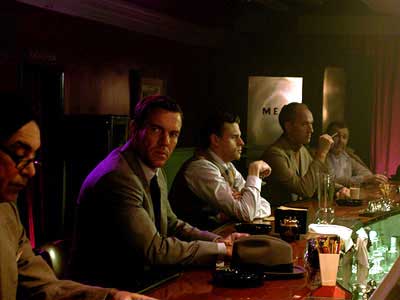Wednesday, July 20, 2005
TRAPPED
 For anyone who lived through the 50's, it is understood that the 60's really started to happen then.
For anyone who lived through the 50's, it is understood that the 60's really started to happen then.
The fractures were apparent and beginning to widen.
It is also true, that the 60's never really happened until the 70's. Civil rights, the sexual revolution, and a huge disruption of social morés really did not climax, so to speak, until 1975 or so.
And, of course, we are still reverberating from it all. The end is not in sight. We still fight the 'cultural wars'.
This film, determinedly, preserves the look and feel and attitudes of the Fifties Issue Movie. I cap that because they always felt as though they were filmed in capital letters.
Todd Haynes modeled this film, Far From Heaven (2002) , out of films like All That Heaven Allows which we saw earlier. He even keeps the 'heaven' in it. That one had Jane Wyman consorting with her gardener Rock Hudson. Haynes ups the ante to the Fifties by using a black gardener. He says that he wanted to show the levels below what the fifties only hinted at.
And, it works; he does show us the fractures further down and makes them wider. Here we have the dread homosexual betray his faithful wife. We see the wife seek solace with a black man only to totally disrupt the 'good society people' of Hartford.
This makes the film very squirmy and difficult to watch. I got up a few times and took a breather. I 'get it' and I don't like it. It seems to be a reproduction with artificial distress poured on. If the Fifties had been this openly fucked up, they would have been the Sixties and the Sixties would be the Seventies and we would be more 'over it' by now.
I suppose as a cinematic exercise this is OK and is to be admired, sorta.
But I didn't much like it and I still don't like Julianne Moore who they keep shooting around because of her diminutive size. It is too obvious.
They made Dennis Quaid a self hating closet case; playing way against type. We do get to see the famous abs though.
I didn't like it and think it is an unnecessary resuscitation of a time we might all forget. But then, maybe we shouldn't forget it. But we didn't have that time. We had our time. See? It exaggerates to the point of non-meaning.
I will give it a 3 out of Netflix5 because I did admire the lighting and cinematography and adherence to the 'look' of the time and the movies that were made then. It is all changing artificial light; lottsa blues and greens and fiery reds for contrast. There are long crane shots of autumnal streets. Blowing leaves.
 Now, for a second thought. The Quaid character is a closet case because he thought that he could somehow undo his early gay experience by marrying. I identify.
Now, for a second thought. The Quaid character is a closet case because he thought that he could somehow undo his early gay experience by marrying. I identify.
He thought that he could not live in the gay world. After all, he is a successful business man. I identify.
He hurts a lot of people in the process of being true to himself. I identify with that too.
What is not clear at all, is his side of the story. This is appropriate because it is all about the wife and much more about her relationship with the black gardener.
But we are left with a nasty taste in our mouth about Quaid and his sordid life. Motel rooms, a younger man, a lot of booze and so on. I identify with some of that too but it is not easy to look at. We would be the same age more or less.
I did my stuff in the early Seventies. The Quaid character has, in some ways, a lot more courage to live out his truth in way more difficult times. Here's to him.
It wasn't easy on anyone, those times. We were all sideswiped by them. I guess that is the point. No one got out or through them easily. But there are those branches with spring blossoms in the last crane shot. Hope.
Now, I have to reconsider. I really did get a lot out of being forced to look at this whole thing through Fifties eyes. Maybe it is a better film than I thought. Maybe a 4. No 5 though. I will see how it 'percolates'.